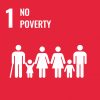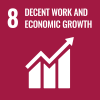Hatay/Gaziantep, Türkiye – When Mohammed arrived in Türkiye in 2013, he had nothing but the clothes on his back. He studied engineering in Syria before the war broke out but found himself having to start from scratch.
“I felt so lost after leaving,” he recalls.
His first few years in Hatay Province were about making ends meet as a farmer and trying his best to learn Turkish. Mohammed then ventured into the gas industry using his engineering background, driven by the ambition to be his own boss.
Little by little, he proved himself in his community through the quality of his work, even landing contracts in neighbouring provinces. “In two years, I was able to compete with the leading local companies.”
But when the devastating February 2023 earthquakes struck, it was back to square one. He and his family were forced to move into a tent, and then a container.
Almost all his equipment was destroyed. He faced the daunting task of having to start from scratch for a second time.

Mohammed employs his brother-in-law Mahmood and a dozen other Turkish and Syrian apprentices. Photo: IOM/Samer Asaid
Over 3 million Syrians currently hold temporary protection status in Türkiye after fleeing war in their homeland. The majority reside in the country's southeast region, where the earthquakes struck the biggest blow.
In the immediate aftermath, Mohammed found meaning in helping his fellow residents at the temporary settlement: “I was helping fix pipes to improve access to water and sanitation.”
One day, he saw an online advertisement for the International Organization for Migration’s (IOM) cash grant programme. He didn’t believe it was real, but nonetheless took a chance and applied.
Mohammed’s application was successful. He received TRY 100,000 (approximately USD 3,000) worth of equipment, including moulds and drilling machines. This helped him on the path of restarting his business.
“Although it did not cover everything that I needed, it was a good start,” he expresses.
One-and-a-half years after the disaster, he now employs 13 workers of both Turkish and Syrian nationality. He was even tapped by authorities to aid in the construction of new apartments for the hundreds of thousands left homeless in Hatay.
Mohammed hopes his story of resilience shows what migrants and refugees can contribute to their new communities. “Five years ago, the father of one of my employees was not happy he was working for a Syrian. He has stayed with me despite receiving other job offers.”
“What matters is the quality of our work, not our nationality or race.”

Jamal has been contracted to produce benches for the restoration of public spaces in Gaziantep. Photo: IOM/Ahmet Abdulhamit
IOM’s cash grant programme is part of its wider support to socioeconomic recovery efforts. Working closely with local authorities, IOM has assisted 373 entrepreneurs, including 328 in earthquake-affected provinces, to purchase items or equipment, enabling them to re-establish or expand their business. In turn, this drives socioeconomic activity.
Jamal, an artisan in Gaziantep Province, shares a similar story as Mohammed. During his early years in Türkiye, he worked tirelessly to integrate into society, eventually mastering the language and finding his niche as a blacksmith.
In the face of last year's tragedy, he thought, “How can I return the favour to those who welcomed us years ago?”
With massive reconstruction needs in the affected region, Jamal was contracted by local authorities for numerous projects. “We helped build containers at half the usual cost. We all joined forces, Syrians and Turkish alike.”
After benefitting from IOM’s cash grant programme, his business took a positive turn: “I was able to purchase necessary equipment and leveraged them to secure larger contracts.”

With his business thriving, Jamal is ready to do more and give back. Photo: IOM/Ahmet Abdulhamit
Today, Jamal’s warehouse in the outskirts of Gaziantep is lined up with light poles, bus stops and railings, ready to be dispatched.
Although he hasn’t seen his family in over a decade, he focuses his energy on making an even bigger name for himself in his industry.
To give back, he offers vocational training and apprenticeship to young people in search of opportunities – like he once was when he first arrived in Türkiye.
Both Jamal and Mohammed's stories highlight the importance of community support and solidarity in overcoming challenges, regardless of one’s background.
Neither know when they can ever return home and see their country at peace again, but their dreams never dim.
“Hope is my guiding work,” Mohammed proclaims.
Mohammed’s and Jamal’s cash grant support was made possible with funding from the United States Government.
Written by Miko Alazas and Ahmet Abdulhamit, IOM Türkiye.


